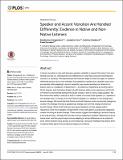Files in this item
Speaker and accent variation are handled differently : evidence in native and non-native listeners
Item metadata
| dc.contributor.author | Kriengwatana, Buddhamas | |
| dc.contributor.author | Terry, Josephine | |
| dc.contributor.author | Chládková, Kateřina | |
| dc.contributor.author | Escudero, Paola | |
| dc.date.accessioned | 2017-01-26T16:30:14Z | |
| dc.date.available | 2017-01-26T16:30:14Z | |
| dc.date.issued | 2016-06-16 | |
| dc.identifier | 249006138 | |
| dc.identifier | 43271df6-a7ef-48cf-bc8a-fdf8e155427b | |
| dc.identifier | 000378029800017 | |
| dc.identifier | 84976271692 | |
| dc.identifier.citation | Kriengwatana , B , Terry , J , Chládková , K & Escudero , P 2016 , ' Speaker and accent variation are handled differently : evidence in native and non-native listeners ' , PLoS One , vol. 11 , no. 6 , 0156870 . https://doi.org/10.1371/journal.pone.0156870 | en |
| dc.identifier.issn | 1932-6203 | |
| dc.identifier.uri | https://hdl.handle.net/10023/10180 | |
| dc.description.abstract | Listeners are able to cope with between-speaker variability in speech that stems from anatomical sources (i.e. individual and sex differences in vocal tract size) and sociolinguistic sources (i.e. accents). We hypothesized that listeners adapt to these two types of variation differently because prior work indicates that adapting to speaker/sex variability may occur pre-lexically while adapting to accent variability may require learning from attention to explicit cues (i.e. feedback). In Experiment 1, we tested our hypothesis by training native Dutch listeners and Australian-English (AusE) listeners without any experience with Dutch or Flemish to discriminate between the Dutch vowels /I/ and /ε/ from a single speaker. We then tested their ability to classify /I/ and /ε/ vowels of a novel Dutch speaker (i.e. speaker or sex change only), or vowels of a novel Flemish speaker (i.e. speaker or sex change plus accent change). We found that both Dutch and AusE listeners could successfully categorize vowels if the change involved a speaker/sex change, but not if the change involved an accent change. When AusE listeners were given feedback on their categorization responses to the novel speaker in Experiment 2, they were able to successfully categorize vowels involving an accent change. These results suggest that adapting to accents may be a two-step process, whereby the first step involves adapting to speaker differences at a pre-lexical level, and the second step involves adapting to accent differences at a contextual level, where listeners have access to word meaning or are given feedback that allows them to appropriately adjust their perceptual category boundaries. | |
| dc.format.extent | 22 | |
| dc.format.extent | 1707426 | |
| dc.language.iso | eng | |
| dc.relation.ispartof | PLoS One | en |
| dc.subject | BF Psychology | en |
| dc.subject | DAS | en |
| dc.subject.lcc | BF | en |
| dc.title | Speaker and accent variation are handled differently : evidence in native and non-native listeners | en |
| dc.type | Journal article | en |
| dc.contributor.institution | University of St Andrews. School of Psychology and Neuroscience | en |
| dc.identifier.doi | https://doi.org/10.1371/journal.pone.0156870 | |
| dc.description.status | Peer reviewed | en |
This item appears in the following Collection(s)
Items in the St Andrews Research Repository are protected by copyright, with all rights reserved, unless otherwise indicated.

